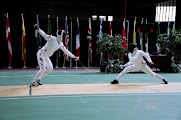INDIVIDUAL / PRIVATE LESSON / CLINIC
They require effort, time, commitment, money, and an idea of the desired outcome. When your child is just starting out, I suggest participating in a group class initially. This will give the student a feel for the sport, establish camaraderie, and boost confidence among peers to achieve difficult skills. But once your child becomes bitten by the “fencing bug” and wants to compete or move up a level, one-on-one lessons with an experienced coach can be invaluable. It’s not only a matter of private lessons improving your child’s fencing skillset – it’s also about how much faster your child will grow as a fencer.
For example, we took a look at a group of young fencers in one of our classes. It was amazing to see the difference between those who were taking private lessons in addition to the class and those who weren’t. The private lesson participants moved to the top of the group and into the next level TWICE as fast!
In another case, we saw two friends (same age, same athletic ability) who started the Beginner Fencing Class at the same time. After two months, one decided to take private lessons, the other didn’t. The results were astonishing: The child taking the private lessons moved into another level at a much more rapid pace.
Getting one-on-one attention will show your child the correct way to handle the foil or epee to give him or her the highest advantage.
During one-on-one lessons coaches will also give your child individualized exercises and drills that will strengthen the muscles they need to excel in fencing. In a private lesson, a fencer and coach can work on the tiny details of each technical element: from the simple basics such as a straight touch to more advanced combinations of complex movements such as multiple parries and attacks. All these elements are executed in private lessons over and over again and again until they are a natural part of the student’s repertoire.
Instructors will also show the student how to develop his or her own approach and style. Coaches can help fencers discover what strengths they have and what techniques work best for them. A coach can also help the student pinpoint their weaknesses on the strip and develop a strategy to counteract them. Having his or her own style is the mark of a masterful fencer.
Additionally, private lessons allow coaches to customize the learning for the skill level and individuality of the fencer. Working one-on-one will enable the coach to spot weaknesses in technique more quickly and help the fencer work through them faster than in a group setting.
One-on-one lessons give the coach the time they need to break down and critique each movement for the individual fencer so that he or she learns the precise way to fence. It can make the difference between being a decent fencer and a fantastic one!
Can your child progress without the benefit of private lessons? Of course they can!
It is pure human nature to mimic each other. That’s how we learn!
When we fence with advanced fencers, we tend to repeat and copy their moves or elements on some degree – especially children, who do this on a more instinctive level rather than a cerebral one.
By attending a class with more advanced fencers, children new to the sport will experience a subtle and natural form of learning through imitation during the exercises and bouting.
The problem with this process of learning is that mimicking behavior can only go so far – the student may see the movements of the advanced fencer, but miss the subtleties of the technique. Or they may learn an incorrect method or bad habit. Unfortunately in group lessons, there are many fencers so the coach cannot fix every mistake that occurs. These habits then become ingrained in the fencer and are difficult to unlearn later on.
After all, it’s easier to learn a new good habit than to unlearn a bad one! This is why we stress that fencers who want to compete need the benefit of private lessons.
Nearly all competitive fencers around the world incorporate private lessons into their regular weekly training routine. Often fencers will take additional private lessons before an important competition to prepare themselves.
Private lessons do require added time and expense, so we suggest that you don’t engage in them unless you or your child is serious about the sport and wants to make this obligation.
We recommend that you discuss how private lessons can be incorporated into your training with your club coach.
Bottom line: Private lessons are well worth the time and commitment. They will help the fencer improve at a much more rapid pace while developing their own style and technique. Private lessons are the key to turning a satisfactory fencer into a dynamite one.
This article is provided courtesy of the Academy of Fencing Masters.
For our private lessons, as well as training group/camps on fencing, please click this link.















1 Comment
Maybe you live not so far away from the world's longest river. http://topdownloadtorrenttoday.us Predefined exercises provide full animation so that you can easily follow the movements for the right posture.
Posted on December 20, 2017 at 7:24 PM
Post a Comment